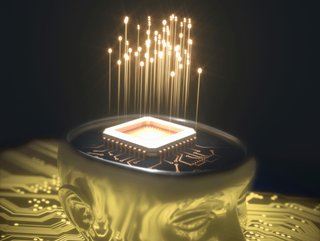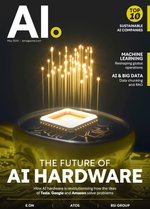AI Hardware: Revolutionising how we Solve Complex Problems

Artificial Intelligence (AI) stands at the forefront of technological innovation, driving profound transformations across industries. According to Next Move Strategy Consulting, the market for AI is expected to show robust growth, with its value of nearly US$100bn projected to grow twentyfold by 2030, reaching nearly US$2tn. This exponential growth underscores the transformative potential of AI in shaping the future of businesses worldwide.
At the core of this revolution lies specialised hardware meticulously engineered to meet the unique computational demands of AI algorithms. Graphics Processing Units (GPUs), Tensor Processing Units (TPUs) and AI accelerators have emerged as indispensable tools, propelling the market to new heights.
GPUs, TPUs and AI accelerators explained
Graphics Processing Units (GPUs), originally intended for rendering graphics, have evolved into powerful accelerators for AI workloads. Their parallel processing capabilities make them ideal for tasks such as deep learning training and inference, excelling in image and video analysis, natural language processing, and more.
Meanwhile, Tensor Processing Units (TPUs), pioneered by Google, stand out as specialised accelerators tailored for machine learning tasks. Renowned for their efficiency and performance, TPUs optimise neural network inference and training processes, significantly contributing to AI hardware design.
Deep learning (DL), a subset of machine learning, plays a pivotal role in shaping AI hardware. Deep neural networks (DNNs) revolutionise industries like healthcare and autonomous vehicles. Leveraging DL techniques, AI-driven hardware enhances efficiency and power, optimizing electronic systems.
This specialised hardware is instrumental in accelerating AI tasks, offering unparalleled processing capabilities optimised for neural network operations. Recent breakthroughs in AI hardware design have ushered in a new era of efficiency and performance, empowering businesses to leverage AI technologies for innovation and growth.
As businesses recognise the transformative potential of AI, investments in specialised hardware are poised to soar, further propelling the market to new heights.
Companies integrating AI hardware
A prime example of AI hardware integration is the work being done at Tesla. The company’s vehicles boast advanced AI hardware and software components, including GPUs and custom-designed AI chips, driving innovations like Autopilot and Full Self-Driving (FSD) capabilities.
Tesla's Autopilot system harnesses AI hardware, notably GPUs, to process data from an array of sensors, including cameras, radar, and ultrasonic sensors. This AI-driven infrastructure enables features like adaptive cruise control, lane-keeping assistance, and automated lane changes, enhancing driving safety and convenience.
Taking AI hardware to new heights, Tesla's Full Self-Driving package incorporates the Full Self-Driving Computer (FSD Computer), a bespoke AI chip. Engineered specifically for autonomous driving, this potent hardware facilitates advanced tasks such as precise object detection, path planning, and decision-making, paving the way for fully autonomous vehicles.
Tesla MD Elon Musk recently shed light on the company’s substantial investment in AI hardware. In a post on X in January, Musk revealed that Tesla will spend more than US$500m on Nvidia hardware in 2024. “The table stakes for being competitive in AI are at least several billion dollars per year at this point,” he said, highlighting the significance of AI hardware in maintaining competitiveness and driving innovation.
Amazon also recently announced it was using new chips for training and running AI. Amazon’s next-generation chips will be used for a wide range of cloud-based workloads and AI training models with the promise of better performance and energy efficiency.
One of the new chips is Trainium2, meant for AI model training and said to deliver up to 4x better performance and 2x energy efficiency when compared to its predecessor. It is also expected to offer 3x more memory capacity than the first-gen Trainium chips.
David Brown, VP of Compute and Networking at Amazon Web Services says: “With the surge of interest in generative AI, our chips will help customers train their ML models faster with better energy efficiency.”
Revolutionising AI hardware at Google and Microsoft
Several other industry leaders are also leveraging AI hardware to revolutionise their respective domains. Google, for example, utilises TPUs extensively in its data centres to accelerate various AI workloads, enabling breakthroughs in natural language processing, image recognition, and more. Sundar Pichai, CEO of Google and Alphabet, states: "TPUs have been transformative for Google. We’ve been using these to improve our own algorithms, and now we’re making this technology available to others through Google Cloud."
Microsoft employs AI hardware in its Azure cloud platform to enhance AI-driven services such as Azure Cognitive Services and Azure Machine Learning. Satya Nadella, CEO of Microsoft, says the company is infusing AI into every product and service it offers. “This includes investing in AI hardware to accelerate innovation and empower our customers to achieve more,” he says.
Nvidia’s GPUs power AI applications in various sectors, from healthcare to finance, enabling breakthroughs in deep learning and accelerating AI research. Jensen Huang, CEO of NVIDIA, says: “Our GPUs are driving AI breakthroughs across industries. From medical imaging to self-driving cars, AI hardware is revolutionising how we solve complex problems.”
Meta Platforms utilises AI hardware to enhance user experiences, personalise content, improve ad targeting and develop advanced AI algorithms for tasks like content moderation and language translation. Mark Zuckerberg, CEO of Meta Platforms, says: “AI is at the core of our mission to connect people. With advanced AI hardware, we're building technologies that bring people closer together and enable new ways of communication and interaction.”
According to a report from McKinsey, the future of AI hardware holds significant promise, particularly in opening new opportunities for chip (semiconductor) companies. Yet McKinsey says to grasp the potential of AI in the chip industry, it's essential to consider the technology stack. The company says developers often encounter challenges related to the hardware layer, which encompasses storage, memory, logic, and networking. Semiconductor companies have a unique opportunity to address these challenges by providing next-generation accelerator architectures that enhance computational efficiency and facilitate data transfer.
In essence, McKinsey's report suggests that the future of AI hardware lies in the hands of chip companies capable of delivering innovative solutions to address the evolving needs of AI applications. By focusing on improving computational efficiency, enhancing data processing capabilities, and optimising memory and storage solutions, they can seize the burgeoning opportunities presented by the AI revolution.
Advances in hardware driving AI innovations
There is no doubt that the integration of specialised hardware like GPUs and TPUs has been instrumental in advancing AI across industries. Companies like Tesla and Amazon have led the way in leveraging AI hardware for innovations like autonomous driving and cloud computing. Meanwhile, tech giants such as Google, Microsoft, Nvidia and Meta Platforms are driving AI breakthroughs in various domains.
McKinsey's report highlights the significant potential for semiconductor companies in the AI hardware market. By addressing challenges in computational efficiency and data processing, chip companies can seize opportunities in the AI revolution. As AI continues to transform industries, the future of AI hardware remains pivotal in shaping technological innovation.
******
Make sure you check out the latest edition of AI Magazine and also sign up to our global conference series - Tech & AI LIVE 2024
******
AI Magazine is a BizClik brand







